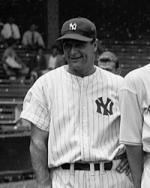Disable ads!
Lou Gehrig
MLB debut June 15, 1923 for the New York Yankees Last MLB appearance April 30, 1939 for the New York Yankees Career statistics Batting average .340 Hits 2,721 Home runs 493 Runs batted in 1,995 Teams New York Yankees (1923–1939) Career highlights and awards 7× All-Star (1933–1939) 6× World Series champion (1927, 1928, 1932, 1936–1938) 2× AL MVP (1927, 1936) Triple Crown (1934) AL batting champion (1934) 3× AL home run champion (1931, 1934, 1936) Hit 4 home runs in one game on June 3, 1932 New York Yankees captain (1935–1939) New York Yankees #4 retired Major League Baseball All-Century Team Major League Baseball All-Time Team Member of the National Baseball Hall of Fame Induction 1939 Vote Special Election (results unknown) Henry Louis "Lou" or "Buster" Gehrig (June 19, 1903 – June 2, 1941) was an American baseball first baseman who played 17 seasons in Major League Baseball (MLB) for the New York Yankees (1923–1939). Gehrig was renowned for his prowess as a hitter and for his durability, a trait which earned him his nickname "The Iron Horse". He finished with a career batting average of .340, an on-base percentage of .447, and a slugging percentage of .632, and he tallied 493 home runs and 1,995 runs batted in (RBIs). A seven-time All-Star and six-time World Series champion, Gehrig won the Triple Crown in 1934 and was twice named the American League's (AL) Most Valuable Player. Gehrig was the first MLB player to have his uniform number retired, and he was elected to the Baseball Hall of Fame in 1939. A native of New York City and attendee of Columbia University, Gehrig signed with the Yankees in 1923. He set several major league records during his career, including the most career grand slams (23) (since broken by Alex Rodriguez) and most consecutive games played (2,130), a record that stood for 56 years and was long considered unbreakable until surpassed by Cal Ripken, Jr. in 1995. Gehrig's streak ended in 1939 after he was diagnosed with amyotrophic lateral sclerosis (ALS), a disorder now commonly referred to as Lou Gehrig's disease in North America, which forced him to retire at age 36 and claimed his life two years later. The pathos of his farewell from baseball was capped off by his iconic "Luckiest Man on the Face of the Earth" speech at the original Yankee Stadium. Gehrig was voted the greatest first baseman of all time by the Baseball Writers' Association in 1969, and was the leading vote-getter on the Major League Baseball All-Century Team chosen by fans in 1999. A monument in Gehrig's honor, originally dedicated by the Yankees in 1941, currently resides in Monument Park at Yankee Stadium. The Lou Gehrig Memorial Award is given annually to the MLB player best exhibiting his integrity and character.
 Read more on wikipedia.org Read more on wikipedia.org
 All quotes by Lou Gehrig All quotes by Lou Gehrig
 Edit Edit
|

|
|
|
|
|
Background photo by Giuliana
|